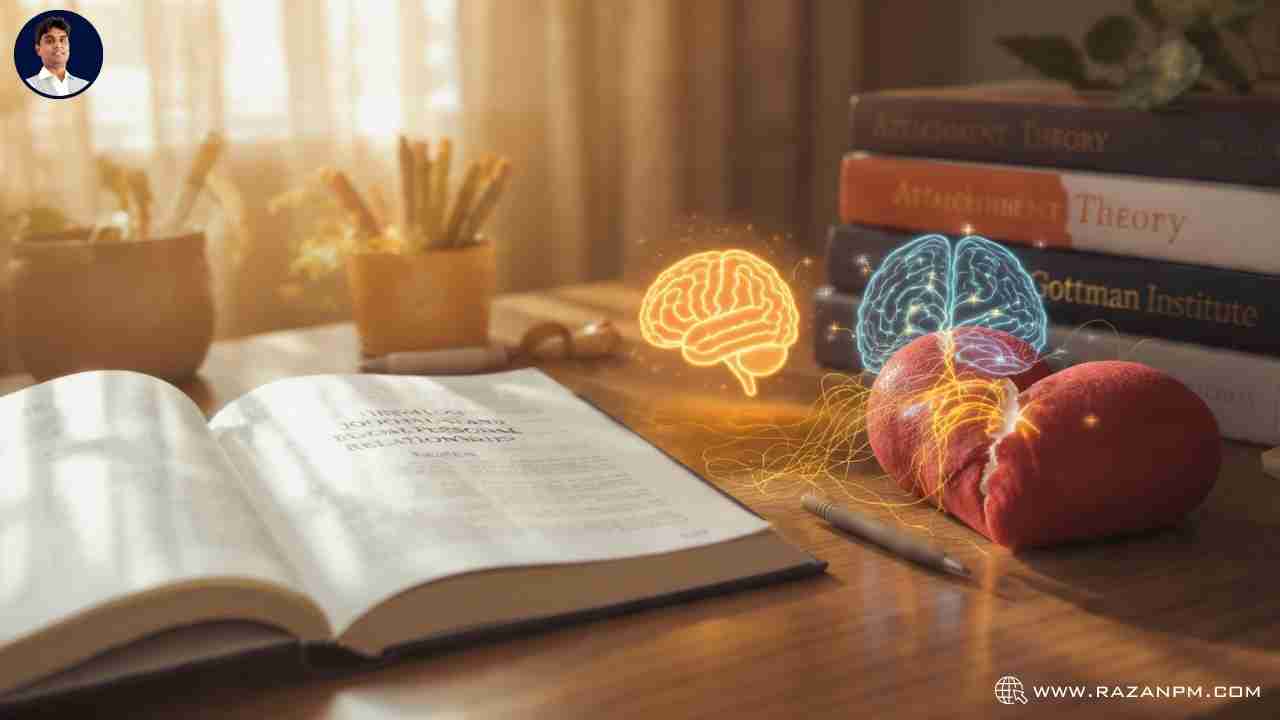It’s funny, isn’t it?
A small thing—like forgetting to reply to a text or leaving the coffee cup unwashed—can trigger a World War of emotions. One partner goes silent, the other assumes rejection, and soon, weeks of no talking feel like an emotional drought.
What started as “I just need space” turns into “I don’t even know how to start again.”
As a Govt.Recognized Counsellor & Mind Healer, I’ve seen couples who once laughed over silly memes now sit across each other, scared to make eye contact. Silence, once comfortable, becomes heavy—like an invisible wall.
And here’s the thing: that silence doesn’t just hurt emotionally. It seeps into your mental health—creating anxiety, self-doubt, and sometimes even trauma responses.
also read: how texting culture is changing genz relationships

If you’re reading this, maybe you’ve been there too.
That uneasy mix of “I miss them” and “I’m not sure they care anymore.”
You replay old memories—your first date, the way they used to hold your hand—and wonder, “Can love really return after so much silence?”
You scroll through their social media, overanalyze their “last seen,” or even convince yourself they’ve moved on.
It’s okay. You’re human.
Silence can make the loudest noise inside your head.
also read: the real psychology behind left onread anxiety

Many couples underestimate the psychological impact of emotional distance.
Here are some signs that your pause might be affecting your mental and emotional well-being:
1. Overthinking and intrusive thoughts – “Did I say something wrong?”
2. Anxiety before communication – Your heart races before texting or calling.
3. Emotional numbness – You stop reacting to love or conflict alike.
4. Sleep disturbances – Your brain replays the silence on loop at night.
5. Loss of intimacy – Physical or emotional closeness feels uncomfortable or unfamiliar.
If this sounds familiar, know that it’s not just relationship drama—it’s psychological disconnection, a real issue that affects your brain and body.
also read: how disorders like insomnia fueldepression?
From a clinical perspective, long emotional silence often activates attachment-related anxiety or avoidance patterns (as described in the DSM-5 under Anxiety Disorders and ICD-11’s Stress-Related Disorders).
When communication stops, the brain perceives it as emotional loss. This triggers the amygdala, the part of your brain responsible for fear and survival. Over time, it can create patterns similar to Adjustment Disorder—a response to life stress where emotional or behavioral symptoms develop within three months of the stressor.
In therapy, I often explain to couples: “Silence isn’t neutral—it’s a message your nervous system doesn’t understand.”
That’s why even after months of no contact, your body still reacts—heart racing, mind spinning—because emotionally, it’s still waiting for closure or reconnection.
also read: how isolation triggers illness anddepression together?

Studies from The Gottman Institute and Journal of Social and Personal Relationships show that emotional withdrawal (stonewalling or avoidance) increases cortisol—the stress hormone—leading to decreased empathy and communication breakdown.
Another study by Dr. Sue Johnson, founder of Emotionally Focused Therapy (EFT), found that couples who re-engaged after guided emotional conversations were 70% more likely to rebuild lasting intimacy than those who avoided communication.
In short: Science agrees—silence kills connection, but vulnerability revives it.
also read: how to stop the cycle of pain anddepression?
Let me share a story.
A couple once came to me—let’s call them Riya and Arjun. They hadn’t spoken properly in six months after a small argument snowballed into complete silence. Both were hurting, but neither knew how to start again.
During our session, I asked Arjun, “If silence could speak, what would it say?”
He looked down and whispered, “I’m scared she won’t listen.”
Then Riya, with tears in her eyes, said, “I thought he didn’t care anymore.”
In that moment, I realized something powerful:
Most couples aren’t tired of each other—they’re tired of not being understood.
So, I created a simple framework—5 Ways to Reignite Love After a Long Break—based on emotional healing, neuroscience, and real relationship recovery stories.
also read: what to do when i love you gets noreply?

Don’t begin with “We need to talk.” Begin with something safe.
A simple “Hey, I saw something today that reminded me of you” can reopen the emotional gate. The tone matters more than the topic.
Psych Tip: In therapy, we call this gentle startup communication—it lowers emotional defenses.
Bring up something that connects you both emotionally—like your favorite café or that trip you almost got lost on.
Memory rekindles connection faster than confrontation.
Why it works: Nostalgia activates the brain’s reward system, increasing dopamine, the “feel-good” hormone.
also read: how hormonal shifts can triggerdepression?
Trust doesn’t come back with big promises—it grows with small, consistent actions.
Reply to messages, show up on time, and express gratitude.
Example: A simple “Thank you for texting back” can sound small but signals emotional safety.
Hold hands again, share eye contact, or cook together. Emotional intimacy is about being present, not just being together.
Therapy Insight: Couples who practice non-verbal connection activities (like silent walks) rebuild oxytocin—the bonding hormone.
Sometimes, a neutral space helps two hearts speak without fear.
If conversations keep turning into conflicts, guided sessions with a Clinical Psychologist or Mind Healer can bridge the gap.
Real Talk: Asking for help doesn’t mean you’ve failed—it means you’re ready to grow.
also read: how fear of rejection kills realconnection?

The “Silent Hug” Technique
1. Stand facing your partner.
2. Hold each other without speaking for 3 minutes.
3. Breathe slowly in sync.
You might feel awkward at first—but soon, your heartbeat will begin to align.
That’s your nervous system remembering safety and love.
This exercise helps regulate emotional responses and rebuilds attachment comfort—something therapy often starts with.
also read: why timing turns simple talks intobig arguments?
These steps can reignite the first spark, but true emotional reconnection needs deeper guidance—understanding emotional triggers, communication patterns, and trauma roots that silence often hides.
Just like Riya and Arjun, your story can shift from distance to discovery—but it takes mindful steps, not rushed moves.
also read: how everyday pressure breaks yourmind?
If you felt a little “seen” while reading this—know that you’re not alone.
Silence doesn’t mean the end; sometimes, it’s just a pause before healing begins.
As a Govt.Recognized Counsellor & Mind Healer, I’ve helped many couples rebuild what they thought was lost.
💬 If this feels familiar, you don’t have to figure it out alone.
👉 Book your 1:1 Consultation Here — let’s help your heart and mind find their voice again.
👉 Begin Your Journey with a 1 on 1 Consultation
👉 Begin Your Journey with a 1 on 1 Consultation

Yes, absolutely. With consistent communication, empathy, and guided emotional healing, couples can rebuild love even after long periods of silence. Research from the Gottman Institute supports that emotional vulnerability restores connection faster than avoidance.
also read: do voice notes kill realconversations?
Often small misunderstandings trigger deep emotional fears or insecurities. The mind moves into self-protection mode, causing withdrawal instead of communication. It’s not about ego—it’s often emotional overwhelm.
also read: how bias turns into deep depression?
Common signs include emotional numbness, lack of interest, anxiety before communication, or feeling like roommates instead of partners. These signs often indicate psychological stress or attachment disruption.
also read: how to tell if emotional separationhas already started?
Start with micro-actions: honest replies, small gestures, being consistent. Trust doesn’t return overnight—it grows through small, safe emotional steps and steady communication.
also read: why kind words create misunderstanding?
Yes. Therapy provides a neutral and supportive environment to express hidden feelings without blame. A Govt.Recognized Counsellor & Mind Healer helps identify emotional patterns and rebuild connection with guided techniques.
also read: how caregiving triggers hidden depression?
Begin with soft communication—start a simple, non-demanding message like “I thought of you today.” Small emotional openings often break long silences and lead to genuine reconnection.
also read: how fibromyalgia fuels hiddendepression?
It varies. Some couples reconnect in weeks; others may take months. The key is consistency, patience, and emotional safety—not rushing the process.
also read: why saying i love you is not enough?
Yes. Prolonged emotional silence can lead to stress, anxiety, and even depressive symptoms (recognized in DSM-5 as adjustment-related issues). Early intervention helps prevent deeper emotional damage.
also read: why emotional intimacy feels unsafefor some partners?
